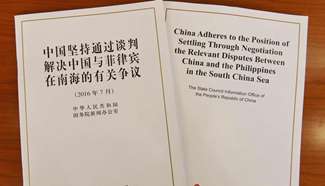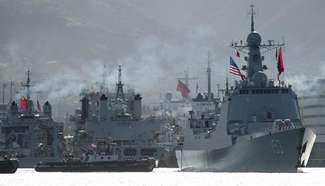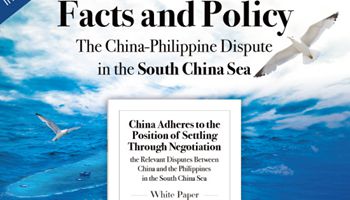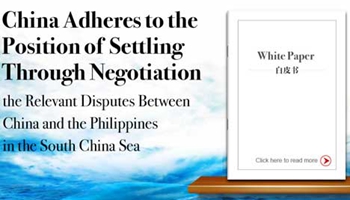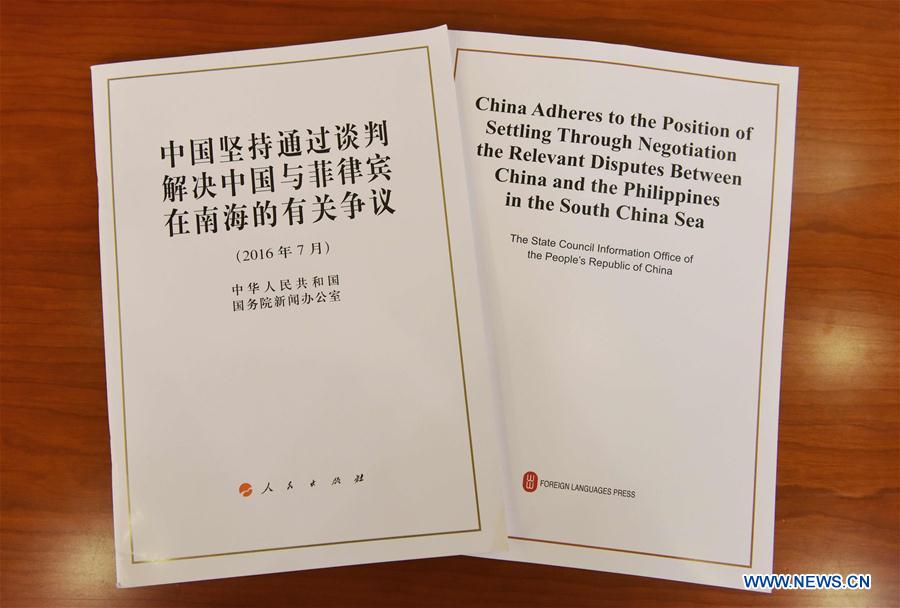
BEIJING, July 13, 2016 (Xinhua) -- Photo taken on July 13, 2016 shows the white paper titled "China Adheres to the Position of Settling Through Negotiation the Relevant Disputes Between China and the Philippines in the South China Sea" issued by Chinese government in Beijing, capital of China. "The Philippines' territorial claim over part of Nansha Qundao is groundless from the perspectives of either history or international law," said the document issued by the State Council Information Office on Wednesday. (Xinhua/Chen Yehua)
BEIJING, July 13 (Xinhua) -- The Chinese government on Wednesday issued a white paper to expound on its position, which calls for settling relevant disputes between China and the Philippines in the South China Sea through negotiation.
"It is the Philippines that has created and stirred up trouble," said Vice Foreign Minister Liu Zhenmin at a press conference held Wednesday to introduce the white paper.
"Violating bilateral consensus in recent years, the Philippines has repeatedly taken moves that complicate and intensify relevant disputes between China and the Philippines in the South China Sea," he said.
The white paper, titled "China Adheres to the Position of Settling Through Negotiation the Relevant Disputes Between China and the Philippines in the South China Sea," was published one day after an award was issued in arbitration unilaterally initiated by the previous Philippine government.
Describing the award as "a piece of waste paper," Liu urged other countries not to "take the opportunity to threaten China."
China hopes other countries can work with it to protect the peace and stability of the South China Sea and "not let the South China Sea become the origin of a war," he said.
The vice minister also said China reserves the right to declare an Air Defense Identification Zone (ADIZ) in the South China Sea in accordance with the extent of the threat.
The white paper issued by the State Council Information Office stated that the core of the relevant disputes between China and the Philippines in the South China Sea lies in the territorial issues caused by the Philippines' invasion and illegal occupation of some islands and reefs of China's Nansha Qundao (the Nansha Islands).
As the international law of the sea developed, a maritime delimitation dispute also arose between the two states regarding certain areas of the South China Sea, it added.
"The Philippines' territorial claim over part of Nansha Qundao is groundless from the perspectives of either history or international law," it said.
The two countries held multiple rounds of consultations on the proper management of disputes at sea and reached consensus on resolving relevant disputes through negotiation and consultation, which has been repeatedly reaffirmed in a number of bilateral documents, according to the white paper.
In 2013, the then-government of the Republic of the Philippines unilaterally initiated the South China Sea arbitration.
By doing so, the Philippines has violated its standing agreement with China to settle relevant disputes through bilateral negotiation, violated China's right to choose means of dispute settlement of its own will as a State Party to the United Nations Convention on the Law of the Sea (UNCLOS), and abused the UNCLOS dispute settlement procedures, it said.
"The Arbitral Tribunal established at the Philippines' unilateral request has no jurisdiction over relevant submissions, and awards rendered by it are null and void and have no binding force," said the document.
"China's territorial sovereignty and maritime rights and interests in the South China Sea shall under no circumstances be affected by those awards. China does not accept or recognize those awards. China opposes and will never accept any claim or action based on those awards," it added.
The white paper also explained that Nanhai Zhudao (the South China Sea Islands) are China's inherent territory, saying the activities of the Chinese people in the South China Sea date back more than 2,000 years.
China is the first to have discovered, named, explored and exploited Nanhai Zhudao and relevant waters, and the first to have continuously, peacefully and effectively exercised sovereignty and jurisdiction over them.
"China's sovereignty over Nanhai Zhudao and relevant rights and interests in the South China Sea have been established in the long course of history, and are solidly grounded in history and law," it said.
China abides by the purposes and principles of the Charter of the United Nations and is committed to upholding and promoting international rule of law. It respects and acts in accordance with international law, the white paper said.
While firmly safeguarding its territorial sovereignty and maritime rights and interests, China adheres to the position of settling disputes through negotiation and consultation and managing differences through rules and mechanisms, it added.
"China endeavors to achieve win-win outcomes through mutually beneficial cooperation, and is committed to making the South China Sea a sea of peace, cooperation and friendship," it said.
In the white paper, China urges countries outside the region to respect the efforts by countries in the region and to play a constructive role in maintaining peace and stability in the South China Sea.
During the press conference, Liu reiterated that settling relevant disputes between China and the Philippines in the South China Sea through negotiation is the theme of Wednesday's white paper, as well as the policy of the Chinese government.
"We hope to work with countries surrounding the South China Sea, including ASEAN members, abide by the Declaration on the Conduct of Parties in the South China Sea (DOC), and maintain peace and stability as well as the freedom of navigation and overflight in the South China Sea," Liu said.
Liu noted that this policy has not changed and will not change. He called on the Philippines to return to the track of negotiation, saying it is the only solution to resolve disputes.





